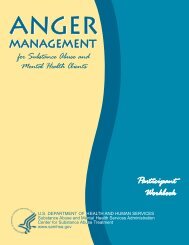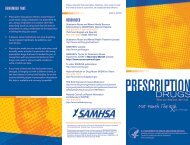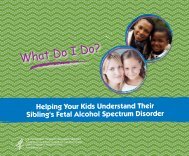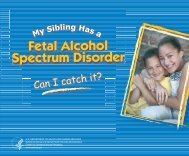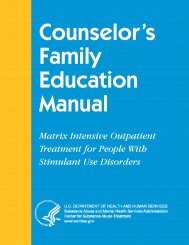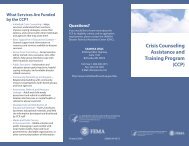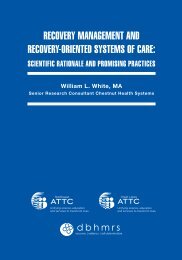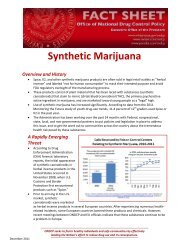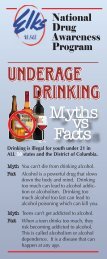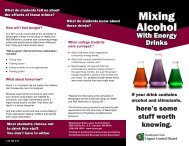Counselor's Manual for Relapse Prevention With Chemically ...
Counselor's Manual for Relapse Prevention With Chemically ...
Counselor's Manual for Relapse Prevention With Chemically ...
Create successful ePaper yourself
Turn your PDF publications into a flip-book with our unique Google optimized e-Paper software.
Transition StageThe transition stage begins the first time a person experiences an alcohol or drug-relatedproblem. As a person's addiction progresses, he or she tries a series of strategies designed tocontrol use. This ends with recognition by the person that safe use of alcohol and/or drugs is nolonger possible.The struggle <strong>for</strong> control is a symptom of a fundamental conflict over personal identity.Alcoholics and drug addicts enter this phase of recovery believing they are normal drinkers anddrug users capable of controlled use. As the progression of addiction causes more severe loss ofcontrol, they must face the fact that they are addictive users who are not capable of controlleduse.During the transition stage, chemically dependent people typically attempt to control their use orstop using. They are usually trying to prove to themselves and others that they can use safely.This never works <strong>for</strong> very long. Controlled use is especially tough <strong>for</strong> people who areparticipating in criminal behavior because the high level of alcohol and drug use among theirpeers makes their lifestyle and use seem normal.The major cause of inability to abstain during the transition stage is the belief that there is a wayto control use.Stabilization PeriodDuring the stabilization period, chemically dependent people experience physical withdrawaland other medical problems, learn how to break the psychological conditioning causing the urgeto use, stabilize the crisis that motivated them to seek treatment, and learn to identify and managesymptoms of brain dysfunction. This prepares them <strong>for</strong> the long-term processes of rehabilitation.Traditional treatment often underestimates the need <strong>for</strong> management of these issues, focusinginstead on detoxification. Patients find themselves unable to cope with the stress and pressure ofthe symptoms of brain dysfunction and physical cravings that follow detoxification. Many havedifficulty gaining much from treatment and feel they are incapable of recovery. The lack of asupportive environment <strong>for</strong> recovery that many criminal offenders experience adds stress andundermines their attempts to stabilize these symptoms. They often use alcohol and drugs torelieve such distress. It takes between 6 weeks and 6 months <strong>for</strong> a patient to learn to master thesesymptoms with the correct therapy.The major cause of inability to abstain during the stabilization period is the lack of stabilizationmanagement skills.Early Recovery PeriodEarly recovery is marked by the need to establish a chemical-free lifestyle. The recoveringperson must learn about the addiction and recovery process. He or she must separate from friendswho use and build relationships that support long-term recovery. This may be a very difficult



